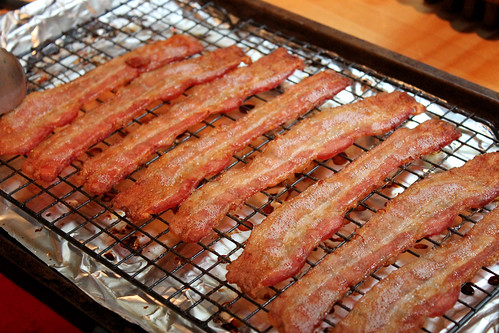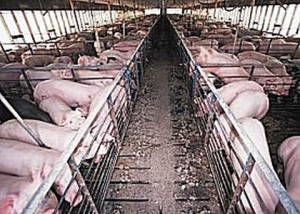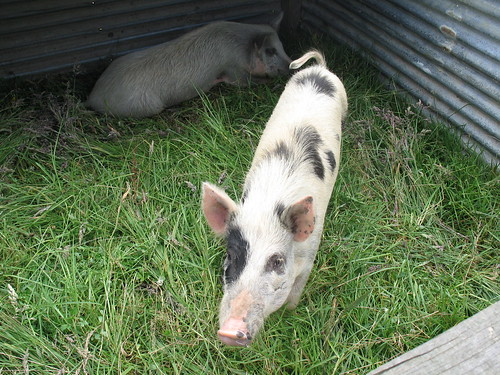 The drought that ravaged much of North American agriculture this past summer also proved devastating to food production in Russia. The worldwide impact of the widespread drought on the supply and cost of animal feed is so severe that the UK National Pig Association (NPA) emphatically declared this week that:
The drought that ravaged much of North American agriculture this past summer also proved devastating to food production in Russia. The worldwide impact of the widespread drought on the supply and cost of animal feed is so severe that the UK National Pig Association (NPA) emphatically declared this week that:
“A world shortage of pork and bacon next year is now unavoidable”
Gulp.
Some farmers have been getting by feeding candy to their animals instead of feed while others have responded by paring their herds.
The NPA notes that the paring of herds by many pig farmers will likely cause the number of animals available for bacon production to drop by 10 percent during the second half of 2013 causing the price of those sizzling strips to double.
 Dave Warner, spokesman for the National Pork Producers Council in the United States doesn’t seem nearly as concerned. He says that while paring of herds is definitely happening in the States, it’s not nearly as widespread as in Europe.
Dave Warner, spokesman for the National Pork Producers Council in the United States doesn’t seem nearly as concerned. He says that while paring of herds is definitely happening in the States, it’s not nearly as widespread as in Europe.
Steve Meyer, a consultant to the pork industry, agrees that bacon prices will probably be under pressure in the US as hog farmers will be reducing their herds by around 3% or so through next spring. Mr. Meyer went on to say that bacon in the UK and in the US is completely different, however, and unlike other countries like Australia which imports as much as 70% of its bacon, the United States does not import any bacon at all.
Wait a minute! Does this mean that when you buy “Canadian bacon” in the United States, it’s not really from Canada?
Guess so.
While it is still too soon to say whether an actual bacon shortage will materialize in the US like is expected in Europe, prices are indeed predicted to rise. Steve Meyer said he wouldn’t be at all surprised to see bacon prices around the $3.70 mark per pound sometime next year. According to the USDA, prices last month hovered around $3.53/lb with $3.56/lb the all time record set back in 2011.
While some consumers are tweeting their dismay at dwindling bacon supplies with some even saying that “the Mayans were right, this is how it’s going down”, others are yawning at the entire affair and feel quite secure in their pork and bacon supplies.

Why so?
These smart consumers buy pastured pork and bacon from small family farms which have not experienced nearly the same devastation from the drought as the conventional hog industry.
Perhaps it’s time to get to know your local pastured poultry farmers before the bacon apocalypse of 2013 strikes.
Sarah, The Healthy Home Economist
Sources: Bacon Shortage Worldwide “Unavoidable” UK Pig Group Says








That’s funny, I started to read this article but stopped when I realized it doesn’t apply to me because I buy pastured pork from a local farmer.
I left the link up on the computer, however, and came back upon it and read the rest… which described my exact reaction!
Turns out that this was all a HOAX!
Turns out that this was all a HOAX!
Sounds like the toilet paper shortage back in the 70’s-
LOL..to add to my previous comment…we’ve had our first frost here already 2 weeks ago. Low temp was 31 degrees.
@Christina…No, pigs and chickens do need a certain amount of grain. My local farmer feeds them organic flax seed, etc… No corn or soy at all. Our growing season is short up here. Pasture is finished already and it’s only September. Leaves are changing color too. Pigs and chickens cannot thrive on hay like cows can, so he has to give them some grain, but as I stated earlier, the grain he gives them is mostly organic flax seed, etc..and no corn or soy.
Flax is as bad as soy.
I shall stock up. Wait, I eat organic bacon. Will that be affected?
There’s going to a lot more food in short supply than just bacon
is the bacon ‘s meat main thing in all meals
we pastured our two pigs we have now and they eat a TON less grain. They would eat even less if we pastured them under an oak or different nut producing tree but we wanted them to till and poop in our on garden.